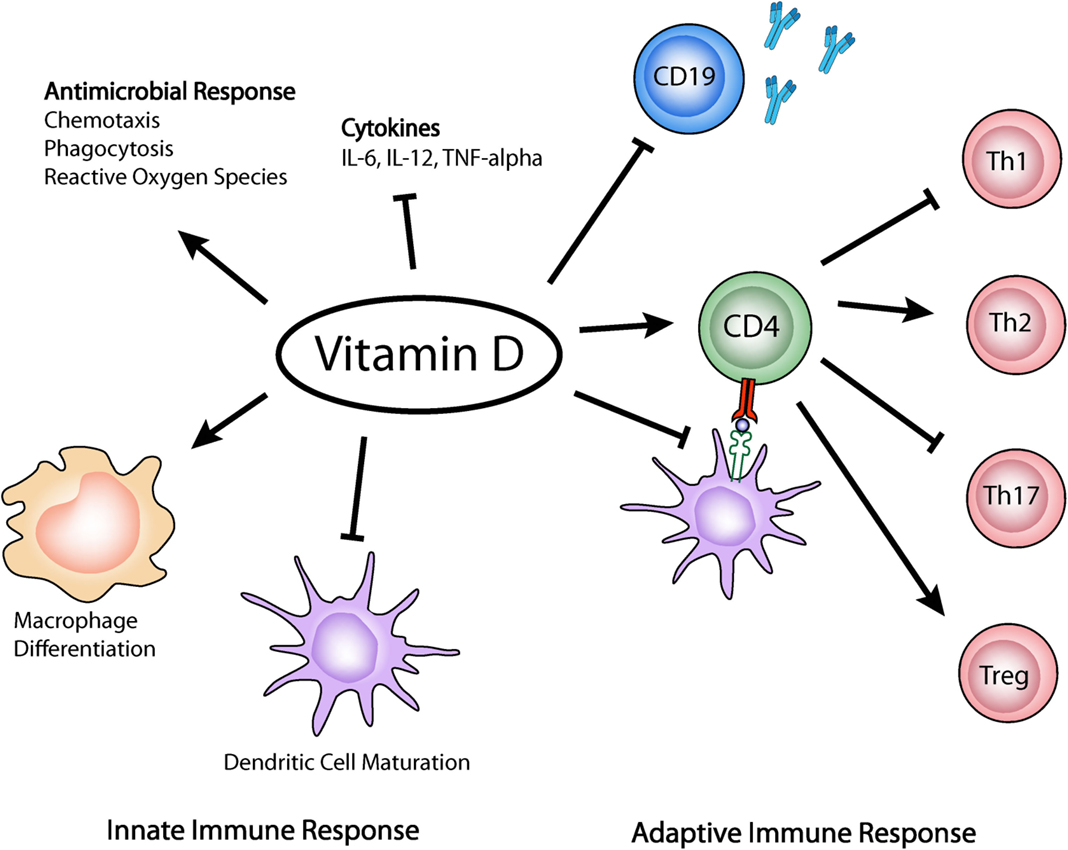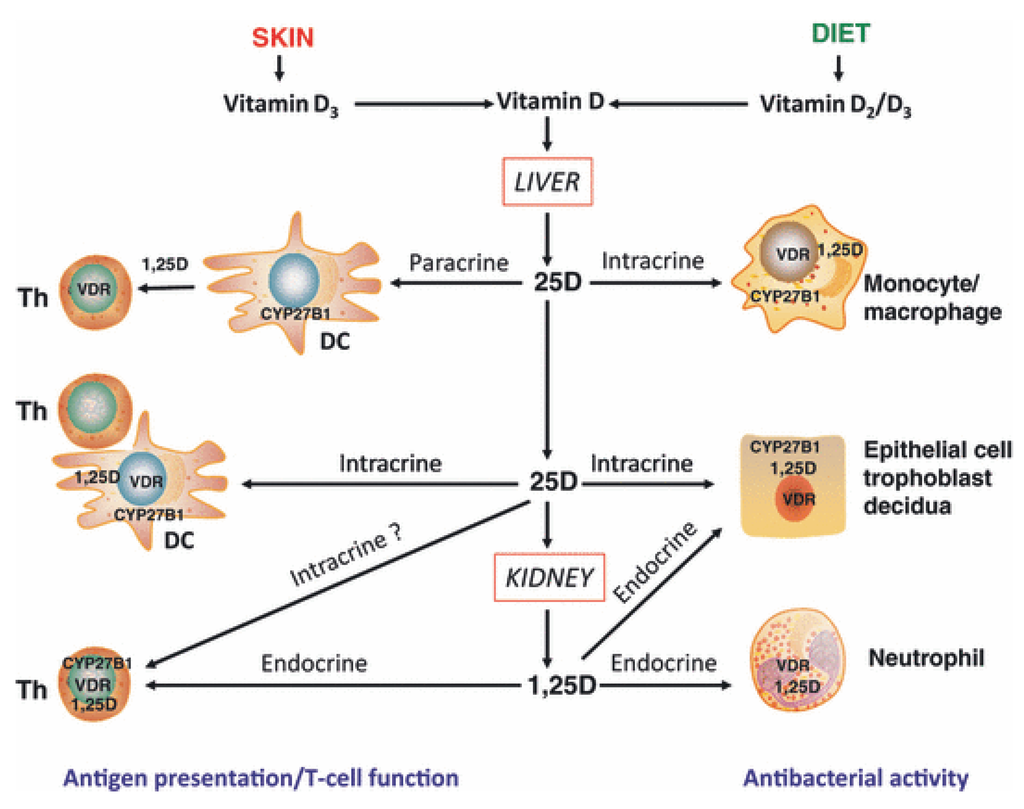Vitamin D & Immune System: How They Work Together. Learn More!
Could a simple nutrient be the key to unlocking a stronger, more resilient immune system? The undeniable link between vitamin D and the immune system is becoming increasingly clear, suggesting this often-overlooked vitamin plays a crucial role in defending our bodies against a myriad of threats.
The intricate dance between vitamin D and our immune defenses is a subject of intense scientific scrutiny, with a growing body of evidence underscoring its significance. Research, particularly in laboratory settings (in vitro), has provided compelling insights into the physiological role of the vitamin D system in immune regulation. This is not merely a theoretical connection; immune modulation can be observed when immune cells are exposed to pharmacological doses of vitamin D metabolites. This modulation underscores vitamin D's active involvement in shaping our immune responses.
The immune system, our body's vigilant guardian, is tasked with a monumental responsibility: protecting us from the constant barrage of foreign invaders. These invaders can range from microscopic bacteria and viruses to more complex organisms. A well-functioning immune system achieves this by initiating protective immunity, a coordinated series of responses that neutralize threats and prevent infection. Simultaneously, it must maintain a state of tolerance, preventing the body from attacking its own tissues. This delicate balance is essential for health, and vitamin D appears to be a key player in maintaining this equilibrium.
- Skymovieshd Why Youre Getting No Results Whats Next Google Discover
- Hdhub4u Justwatch Streaming Legality Alternatives In 2025
The implications of vitamin D deficiency on the immune system have garnered significant attention in recent years. As our understanding has deepened, a concerning pattern has emerged: in the context of vitamin D deficiency, there appears to be an increased susceptibility to infections. This susceptibility is further complicated by a "diathesis," or a predisposition, in individuals who are genetically vulnerable. This suggests that vitamin D status can not only influence our ability to ward off infection but also how our genetic makeup interacts with this vulnerability.
One area of particular focus is the impact of vitamin D on the innate immune system. This branch of the immune system acts as the first line of defense, rapidly responding to pathogens and initiating inflammatory responses. Vitamin D, specifically its active form calcitriol, is recognized as a potent regulator within the innate immune system. It has been shown to influence the function of macrophages, neutrophils, dendritic cells, natural killer (NK) cells, and innate lymphoid cells (ILCs), all critical components of this initial defense.
Calcitriol's influence extends beyond simple activation; it's a multifaceted regulator, capable of directing and coordinating a variety of immune responses. The response to a bacterial infection, for instance, provides a clear example. As pathogens invade, the innate immune system is activated, and vitamin D, through calcitriol, helps orchestrate a response that aims to eliminate the threat. This includes promoting antimicrobial responses within cells like macrophages, thus directly attacking the invading bacteria.
- Exploring Jim Shockeys World Hunting Tv More
- Aagmal Unveiling The Power Across Industries Insights Future
It is also clear that vitamin D's roles extend far beyond its known influence on calcium and bone homeostasis. Although it has long been recognized for its essential functions in bone health and calcium regulation, the implications of its role in the immune system are truly remarkable, highlighting the breadth of this nutrient's impact. The discovery of vitamin D receptors on almost every cell of the immune system was a pivotal moment, providing the first substantial clue of this intimate relationship.
The vitamin D system's influence in immunity, especially the innate immune system, is extensive. Vitamin D is involved in the regulation of innate immunity, enhancing the body's defenses against microbes and other pathogenic organisms and also modulating the adaptive immune system through direct and indirect pathways.
The effects of vitamin D on immune cells are complex. Research has shown its functions support the innate and adaptive immune systems.
The adaptive immune system is a highly specialized arm of the immune defense. It's tasked with developing highly specific responses to encountered pathogens, memorizing them for future encounters, and launching a targeted response if a pathogen is detected again. Vitamin D plays a role in this adaptive system by helping to modulate immune responses.
Vitamin D is also crucial in helping to reduce inflammation. Inflammation is a complex biological response to harmful stimuli. While it is necessary for healing and protecting from infection, excessive or chronic inflammation is linked to the development of autoimmune diseases. Vitamin D, by modulating immune responses, helps keep inflammation in check, thus protecting the body from the damage that chronic inflammation can cause.
Low levels of vitamin D increase susceptibility to infections and diseases. Numerous studies show a strong association between low vitamin D levels and a higher incidence of respiratory infections, including the common cold and influenza. This correlation extends to other conditions, including autoimmune diseases, which are characterized by the immune system attacking the bodys own tissues.
Sunlight, fatty fish, and fortified foods are the primary sources of vitamin D. Sunlight exposure prompts the skin to synthesize vitamin D, while fatty fish (such as salmon, tuna, and mackerel) are natural sources of the vitamin. Many food products, like milk and cereal, are fortified with vitamin D to boost daily intake.
Further research has uncovered that people with low levels of vitamin D have colds, flu, and viral illnesses more frequently. The connection extends to various ailments. Studies have shown an association between low levels of vitamin D and infections, inflammation, and autoimmune diseases, which suggests a possible cause and effect relationship.
Vitamins C, B6, and E, along with zinc and selenium, are vital for supporting immune system function. Vitamin C, for example, is a well-known immune system booster, playing a key role in protecting the body from oxidative stress and supporting the function of immune cells.
Ongoing research on the role of vitamin D in immune system regulation is expected to further enhance our understanding of how this essential nutrient protects us against autoimmune diseases.
Recent epidemiological evidence has revealed a significant association between vitamin D deficiency and an increased incidence, or aggravation, of various health conditions. These observations underscore the importance of maintaining adequate vitamin D levels to bolster immune health.
The impact that vitamin D has on the immune system is a prime example of the broad spectrum of actions that vitamin D has on physiologic and pathologic processes. Although originally recognized as a key regulator of bone and mineral homeostasis, which it clearly is, the influence of vitamin D on the immune system illustrates its role beyond bone.
The significance of vitamin Ds role in immune function was established and confirmed following the discovery that nearly all cells of the immune system contain vitamin D receptors. The effects of vitamin D on immune cells are very complex, but research has shown its functions support the innate and adaptive immune system.*
Vitamin D and 1,25(OH)2D3 modulate the innate immune response. The regulatory role of this molecule has been shown to affect the innate immune system, such as macrophages, dendritic cells, NK cells, and ILCs, so, as a critical molecule plays a role in many diseases' pathophysiology.
The following table summarizes key aspects of Vitamin D's interaction with the immune system:
| Key Aspect | Description | Significance |
|---|---|---|
| Vitamin D Receptors | Found on nearly all cells of the immune system. | Allows vitamin D to directly influence immune cell function. |
| Innate Immune System Modulation | Calcitriol (active form of vitamin D) regulates macrophages, dendritic cells, NK cells, and ILCs. | Supports the first line of defense against pathogens; promotes antimicrobial responses. |
| Adaptive Immune System Modulation | Vitamin D helps modulate immune responses, affecting T and B lymphocytes. | Influences the development of specific immune responses and immune memory. |
| Inflammation Reduction | Vitamin D helps regulate inflammation and reduces chronic inflammation. | Protects against excessive inflammation linked to various diseases. |
| Infection Susceptibility | Low vitamin D levels are associated with increased susceptibility to infections. | Highlights the protective role of vitamin D against pathogens. |



Detail Author:
- Name : Fabiola Anderson
- Username : fblanda
- Email : bergstrom.jonathon@larson.org
- Birthdate : 1990-07-20
- Address : 4150 Murray Fort Weimannmouth, ME 18256-7741
- Phone : +1-626-450-2664
- Company : Monahan, Cremin and Batz
- Job : Curator
- Bio : Ea quam deserunt possimus eos omnis. Facilis qui necessitatibus ab inventore ut id. Dolore soluta omnis expedita nemo.
Socials
facebook:
- url : https://facebook.com/eliane_xx
- username : eliane_xx
- bio : Est aperiam laboriosam mollitia aut sed. Ea quo esse inventore et.
- followers : 691
- following : 1229
twitter:
- url : https://twitter.com/zulauf2008
- username : zulauf2008
- bio : Cum nam velit harum ducimus. Numquam quos quo aspernatur at.
- followers : 1861
- following : 1861
tiktok:
- url : https://tiktok.com/@zulaufe
- username : zulaufe
- bio : Sequi omnis et quaerat. Corporis quia ea laudantium.
- followers : 3322
- following : 584